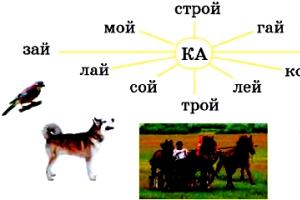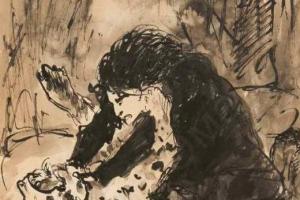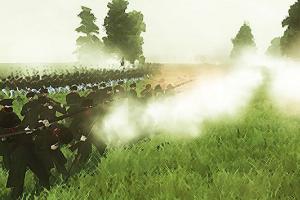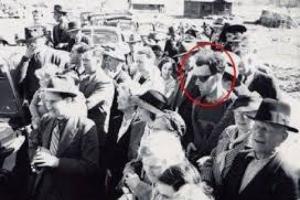Lermontov’s intention to write “notes of a young monk aged 17” dates back to 1831. Since childhood he has been in a monastery; I haven’t read any books except sacred ones. The passionate soul languishes. Ideals..."
Returning from exile in the Caucasus, Lermontov returned to his previous plan. But, unlike the first experiments, the new material - Caucasian - became an integral, organic element of the created poem. Its action develops in Georgia. The hero is a young highlander, taken prisoner at the age of six by a Russian general (according to the testimony of the poet’s relatives, he meant General A.P. Ermolov).
On the cover of the draft autograph it is written in Lermontov’s hand: “August 5, 1839.” The following year, the poem was published in the book “Poems of M. Lermontov”.
In the draft autograph the poem was called "Bary". Lermontov added a footnote to this title: “Beri, in Georgian: monk.” But the hero of the poem is not a monk - he is only being trained to become a monk. The word “novice” in the Georgian language corresponds to the word “mtsyri”. Under this title the work was published in the collection of 1840.
In the final edition, the poem contains twenty-six chapters. In addition to the two introductory ones, they represent the confession of the main character.
As an epigraph, Lermontov chose a biblical saying, which means: “Tasting, I tasted little honey, and now I am dying.” This epigraph emphasizes Mtsyri’s love of freedom.
In the first stanza, Lermontov described the ancient Mtskheta Svetitskhoveli Cathedral, where the graves of the last Georgian kings are located - Heraclius II and George XII, under whom Georgia was annexed to the Russian kingdom.
The scene of the battle with the leopard was suggested to Lermontov by an ancient folk song about a tiger and a young man, widespread in Georgia. In Chapter 10 there is an echo of the Georgian legend about the hero Amirani, who was thrown from heaven and fell into an underground abyss.
In May 1840, Lermontov read an excerpt from “Mtsyri” - a fight with a leopard - at Gogol’s name day in Moscow. “And they say I read it wonderfully,” reported ST. Aksakov according to the guests who were present at the birthday dinner that day.
According to I.L. Andronikov
The purpose of the lesson: create conditions for students to become acquainted with the history of the creation of the poem, promote the development of students’ skills in identifying the structural features of the work
Vocabulary work.
Poem - a large poetic work with a detailed plot. Poems are usually classified as lyric-epic works, since, talking about the fate of their heroes, drawing pictures of life, the poet expresses his own thoughts, feelings, and experiences in the poem.
Subject - depiction of characters and situations taken by the author from reality and transformed in a certain way in the system of a given artistic world. (This is what the author writes about.)
Idea - the main, generalizing idea in a work of art, reflecting the author’s attitude to reality and appearing through the entire system of images.
Plot - the main episodes of the event series of a literary work in their artistic sequence (that is, in the sequence provided for by the composition of this work).
Composition - construction of a work of art, the structure of combining individual parts into one whole.
During the classes
I lived little and lived in captivity.
Such two lives for one,
But only drunken anxiety,
I would trade it if I could.
M.L. Lermontov "Mtsyri".
1. The history of the creation of the poem. Teacher's word.
In 1837, Lermontov decided to write “the notes of a young monk of 17 years old. Since childhood he has been in a monastery; I haven’t read any books except sacred ones. The passionate soul languishes. Ideal...” Eight years passed from this recording to the appearance of “Mtsyri”. During this time, Lermontov returned to the planned plot several times. First he writes the poem "Confession", which takes place in Spain in the middle of the century. The hero of "Confession" is a monk who broke his vow, fell in love with a nun and was condemned to death for this. In 1835 - 1836, the poem “Boyar Orsha” appears, the hero of which, Arseny, a powerless slave of a powerful boyar, raised in a monastery, falls in love with a young lady and also brought the monks to trial, but manages to escape. In these two works, where monologues - confessions occupy a large place, there are lines that were later included in the poem "Mtsyri", written in 1839. It was in it that Lermontov's plan found its most perfect embodiment.
The action of the poem takes place in Georgia, which Lermontov knew well. The emergence of the plan, biographer Lermontov P.A. Viskovatov connects it with the poet’s journey along the old Georgian Military Road. Then Lermontov visited the ancient capital of Georgia, the city of Mtskheta near Tbilisi), located at the confluence of the Aragva and Kura rivers; Svetitskhoveli Cathedral, where the graves of the last Georgian kings Irakli II and George XII are located. There, according to relatives
Lermontova A.P. Shan-Girey and A.A. Khastatov, Lermontov met a lonely monk who told him his story. A highlander by birth, he was captured as a child by General Ermolov. On the way, the boy fell ill, and Ermilov left him in the monastery. The little highlander could not get used to monastic life for a long time, he was homesick and tried to escape to his homeland. The consequence of one such attempt was a long, serious illness that almost killed him. However, in the end he came to terms with his lot and spent his life within the walls of the ancient monastery.
The prototype of the monastery described in the poem was the Jvari monastery, standing on the mountain opposite Sveti Tskhoveli, on the other side of the river.
II. Expressive reading of the poem by the teacher.
In a strong class, the poem is read at home independently.
for unprepared classes - drawing up a plan for a poem with notes in notebooks.
III. Conversation based on the poem read.
The goal is to identify students’ attitude to Lermontov’s work.
- What impressions did Lermontov’s work make on you?
What scenes in the poem are most memorable?
How do you imagine the main character?
- What feelings does the hero of the poem make you feel? Did they change as you read?
What would you say is the main mood of the poem?
(Sad, sad; heavy, hopeless; free and sad at the same time; there is a feeling of loneliness and happiness, faith in victory.)
I V . Determining the theme and idea of the work.
Let's reread the epigraph to the poem. It is taken from the biblical legend about the Israeli king Saul and his son Jonathan, a young man “worthless and disobedient,” as his father called him in the heat of anger. One day Saul made an oath: whoever of his soldiers eats bread until the evening, until he takes revenge on his enemies, will be cursed and die. Jonathan broke his oath. Having arbitrarily attacked his enemies and defeated them, he, mortally tired, dipped a stick in a honeycomb in the forest, “and turned his hand to his mouth, and his eyes brightened.” Saul, having learned about this, decided to kill his son. Jonathan said: “I tasted a little honey with the end of the stick that is in my hand, and now I must die.” But Saul said to the people: “Shall Jonathan die, who brought such great salvation to Israel? Let this not happen. And he freed Jonathan’s people, and he did not die.”
- What do you think, with what intonation - humility or protest - did Jonathan pronounce these words when answering Saul?
- Initially, Lermontov wanted to choose the French saying “There is only one homeland” as the epigraph to the poem “Mtsyri”. Why do you think the poet abandoned such an epigraph and turned to the Bible (“Tasting, I tasted little honey, and now I’m dying”)?
- How is the epigraph related to the theme and idea of the work?
The theme of “Mtsyri” is the image of a strong, brave, rebellious man, taken prisoner, who grew up in the dark walls of a monastery, suffering from oppressive living conditions and who decided, at the cost of risking his own life, to break free at the very moment when it was most dangerous:
And at the hour of the night, terrible hour,
When the thunderstorm scared you,
When, crowded at the altar,
You were lying prostrate on the ground,
I ran.
The idea is that 3 days of real life in freedom is better than many years of imprisonment within the walls of a monastery, where a person does not live fully, but exists. For the hero, death is better than life in a monastery.
V . The plot and composition of the poem.
1. A group of questions aimed at ensuring that schoolchildren master the content of the poem:
- What did Mtsyri see when he was free?
- What did he do after breaking out of the monastery?
- What did the hero learn about himself in three blissful days?
- Why is there such a brief summary of Mtsyri’s life in the monastery?
(Life in the monastery is not very colorful, and three days of freedom became a whole life. And what to write about - about suffering?)
2. What is the plot of the poem?
(It is simple: the story of Mtsyri’s short life, the story of his failed attempt to escape from the monastery. Mtsyri’s life is poor in external events; we only learn that the hero never experienced happiness, was captured from childhood, suffered a serious illness and found himself alone in a foreign land and among strangers to him, monks. The young man makes an attempt to find out why man lives, what he was created for. Escape from the monastery and three-day wandering introduce Mtsyri to life, convince him of the meaninglessness of monastic wandering, bring a feeling of joy in life, but do not lead to the desired goal - to return his homeland and freedom. Not finding a way to his native country, Mtsyri will again end up in the monastery. His death is inevitable; in his dying confession, he tells the monk about everything that he managed to see and experience during the “three blissful days.”)
3. In the poem, such a sequence in the presentation of the plot is not maintained.
Look again at the text of the poem and determine how it is constructed.
- What does chapter 2 give us for understanding the character of the hero?
(The composition of the poem is very unique: after a short introduction depicting the view of an abandoned monastery, the short second chapter - stanza - tells the whole life of Mtsyri, and all other chapters (there are 24 of them) present the hero’s monologue, his confession to the monk. Thus, the author talks about the hero’s life told in 2 chapters, and an entire poem was written about the three days spent in freedom. And this is understandable, since three days of freedom gave the hero as many impressions as he had not received during many years of monastic life.)
- Why do you think the narration in subsequent chapters is handed over to the hero?
(In the center of the poem is the image of a young man, placed by life in unusual conditions. Monastic existence is poor in external events, it does not bring joy to a person, but also cannot destroy his aspirations and impulses. The author pays main attention to these aspirations, to the inner world of the hero, and the external circumstances of his life only help to reveal his character. The monologue - confession allows one to penetrate into the innermost thoughts and feelings of the hero, although the young man at first declares that the story only tells about what he saw and what he did, and not what he experienced (“can the soul be tell me?” he turns to the monk.)
- The word “confession” has the following meaning: repentance of sins before the priest; frank confession of something; communicating your thoughts and views. In what meaning do you think this word is used in the poem?
- The composition of the monologue - confession makes it possible to gradually reveal the inner world of the hero. Look through the text, determine how it is built?
(Chapter 3,4,5, - Mtsyri talks about his life in the monastery and reveals what was not known to the monks. Outwardly submissive, “a child at heart, a monk at heart,” he was obsessed with a fiery passion for freedom, a youthful thirst for life with all its joys and sorrows. Behind these dreams and aspirations one can discern the circumstances and reasons that brought them to life. The image of a gloomy monastery with stuffy cells, inhuman laws and an atmosphere where all natural aspirations are suppressed appears.
Chapter 6.7 - Mtsyri tells what he saw in freedom. The wonderful world he discovered contrasts sharply with the gloomy appearance of the monastery. The young man is so carried away by the memories of the living pictures he has seen that he seems to forget about himself and says almost nothing about his feelings. The kind of pictures he remembers and the words with which he paints them reveals his fiery nature, integral in his aspirations.
From chapter 8, Mtsyri talks about the external events of his three-day wandering, about everything that happened to him in freedom, and about everything that he felt and experienced during these days of his unique life. Now the sequence of events is not disrupted, we move step by step with the hero, vividly imagine the world around him and follow Mtsyri’s every spiritual movement.
Chapter 25-26 - Mtsyri’s farewell and his will. Unable to return to his homeland, Mtsyri is ready to die. But before his death, he refuses to acknowledge the monastic existence. His last thoughts are about his homeland, freedom, life.)
V I. Conclusions
From everything that has been said about the composition of the plot, students learn the following:
1. The poem consists of an introduction, a short story by the author about the life of Mtsyri and a confession of the hero, and the order of the events has been changed.
2. The plot of the poem is not the external facts of Mtsyri’s life, but his experiences.
3. All events of Mtsyri’s three-day wanderings are shown through his perceptions.
4. The mentioned features of the plot and composition allow us to focus all attention on the character of the central character.
VII . Homework.
1. Prepare a retelling of “Mtsyri’s life in the monastery. The character and dreams of a young novice."
2. Answer the questions:
- What is the purpose of Mtsyri’s escape? (Write quotes in your notebook.)
- Which episodes of Mtsyri’s three-day wanderings do you consider especially important? Why?
- Why did Mtsyri die?
In the works of the Russian poet and prose writer M.Yu. Lermontov's poem as a genre, as well as the theme of the Caucasus, has always occupied a special place. “Mtsyri” is a work written in adulthood and embodying the best experience of the romantic author, who more than once glorified the majestic nature of the mountains and created the image of an indomitable and freedom-loving hero.
The difficult history of the creation of Lermontov’s poem “Mtsyri” has always aroused interest among readers. Moreover, its plot helps to understand the ideals and moral beliefs of the author himself. To some extent, the hero’s confession can be considered a way of expressing the thoughts and hopes that tormented the poet in difficult times for Russia.
How did the idea for the poem “Mtsyri” come about?
The history of the creation of the work goes back to Lermontov’s youth. At the age of seventeen, he left a note in which he noted that he would like to dedicate one of his creations to a peer who was languishing in a monastery (the poet associated it with a prison) and dreaming of finding freedom. Lermontov himself wrote that the most difficult thing for him at that moment was the choice of ideals. As long as they were completely incomprehensible to the author’s passionate nature, the work failed. Everything that was possible to write (these poems of the 30s “Confession” and “Boyarin Orsha”) was not what the young man dreamed of.
The history of the creation of the poem “Mtsyri” by Lermontov: chronology

The hero-novice had related images in the poet’s earlier works. In 1830, the poem “Confession” was written. It was based on the monologue of a young Spanish hermit who ended up in a monastery-prison. The hero, sentenced to death, does not regret his fate at all. On the contrary, he rebels against cruel laws and shows readiness to fight for human love. He told the old monk about his unfulfilled dreams and aspirations - this already reveals the plot basis of “Mtsyri”.
A little later, the story of the creation of the story “Mtsyri” gets its development. In the mid-30s, Lermontov wrote another poem - “Boyarin Orsha”. The action in it takes place during the terrible years of the reign of Ivan the Terrible. The life story of the main character Arseny directly echoes the fate of the Spaniard, and some lines of their fiery speeches are almost completely repeated. In the new poem, the plot becomes more complex and includes the story of the unhappy love of a simple serf and the daughter of a noble boyar. Later, the main ideas of these works (by the way, Lermontov never published them) will be embodied in the story about Mtsyri, which allows us to talk about their direct relationship.
Thus, years passed before the youthful idea of M.Yu. Lermontov was embodied in the plot of a famous romantic poem. So the history of the creation of the work “Mtsyri” covered several years of the author’s work.
Travel along the Georgian Military Road
The next impetus for the realization of the poet’s plans was the first exile. In 1837 M.Yu. Lermontov, on his way to the place of “imprisonment,” drove past one of the Caucasian monasteries in Mtskheta (that was the name of the capital of Georgia in old times). Here he met with an already elderly monk, with whose image the story of the creation of “Mtsyri” is now associated. Lermontov, according to P. Viskovatov, after the conversation, remembered his old dream.

Bary (as the monastery minister was called in Georgia) told the sad story of his own life. Once upon a time, as a six-year-old boy, he was captured and brought by a Russian general (according to Lermontov - Ermolov) to these parts. One of the novices of the Javari monastery treated the child with sympathy and kept him with him. The prisoner at first tried to protest, even attempted to escape, which almost ended in his death. However, over time, he completely resigned himself to his fate and forever remained to live among the monks. It was this story that inspired Lermontov to write a new story about a freedom-loving and rebellious hero. So the fate of the old Bary and the history of the creation of the poem “Mtsyri” turned into one.
Working on a piece
Returning from the Caucasus, the poet returned to his old plan and organically combined it with the story he had heard. The wild and beautiful nature of the Caucasus, or rather the surroundings of the Javari monastery, located near the confluence of the two mighty and Aragva, was most suitable as a background (a feature of romantic poems) for the unfolding events. I also remembered Georgian folklore works (for example, the legend of the wild leopard), heard by Lermontov on previous trips to the Caucasus. It was they who significantly influenced the character of Mtsyri. The history of the creation of the poem, thus, became increasingly tied to the well-known features of life in the Caucasus and personal impressions left over from repeated visits to these places. As a result, the text of the romantic poem was born quite soon: the author’s note was preserved on its manuscript, indicating the day the work was completed: August 5, 1839. And the next year the work was published in a collection of poems by the poet.

The publication
The history of the creation of the poem “Mtsyri” also includes S. Aksakov’s story about how in May 1840 the poet personally read the chapter “Fight with the Leopard” at the name day of the writer N.V. Gogol. The writer himself was not present at the evening, but communicated with the guests who were there. According to him, Lermontov’s new “brainchild” was greeted with delight and evoked a lively response.

He left other memories of his acquaintance with the poem. He wrote that in 1839 he visited Tsarskoe Selo, where the poet was at that moment. One evening he visited Lermontov, who was in an excited state, and read him a new “magnificent” poem called “Mtsyri” from beginning to end.
Formation of the plot basis
Processing the story you heard and correlating it with the ideological concept of the work is also the story of the creation of “Mtsyri”. Lermontov did not immediately come up with such a name. In the draft version the poem was called "Bary". As the work progressed and the creative concept was realized, the title of the work changed. The word "beri" translated into Russian means "monk". But Lermontov’s hero had not yet undergone tonsure, so “Mtsyri” was more suitable for his name. In addition, in the Georgian language this word had another meaning - a stranger, a lonely person, without relatives and friends. This fully characterizes the main character of the poem.
Call of a passionate soul
The fates of the old man from Javari, who talked with the poet, and the young man from the poem turned out differently - this was fundamentally the author’s approach. The first accepted his fate and lived in the monastery until old age. The second wants to gain freedom by any means. In his quest, he is not afraid to oppose the unfamiliar, but so close to him, world of nature. She is a symbol of free life for Mtsyri.
The history of the creation of the poem also includes a similar transformation in the life of a young captive - the image of an old man largely determined the spirit of the hero born in the Caucasus.
Why Mtsyri dies
The ending of the poem is tragic. Mtsyri, who so strived to find unity with nature, dies. According to the laws of romanticism, the hero does not find unity either with the monks who have been living next to him for several years and who wish him well, or with the natural elements of nature. The first ones are alien to Mtsyri in spirit. The latter prevail over the hero’s monastic upbringing.

The ideological concept of “Mtsyri” and the history of the creation of the poem testify to the rebellious spirit of the poet himself, who was suffocating in the atmosphere of soullessness that reigned in Russia in the 30s of the 19th century. This is his dream of a “giant nature”, striving to fight and ready to go to the end in his quest.
1839, August 5 - on this day, as evidenced by the date on the manuscript, Mikhail Yuryevich Lermontov completed work on the poem “Mtsyri”. The writing of the work was preceded by many years of searching for a source of inspiration, thinking about the embodiment of the idea and, of course, direct work on the text.
In his diary, seventeen-year-old Lermontov wrote the following: “To create notes of a young monk at the age of seventeen. He has lived in a monastery since childhood. He reads only holy books.” Another 10 years would pass before young Mikhail was able to bring his plan to life.
The creation of the poem “Mtsyri” was preceded by work on other works - “Confession” and “Boyar Orsha”. Both stories tell the reader about the fate of people who dedicated themselves to serving God: in “Confession” the lyrical hero, a monk, is condemned to execution for love, and in the poem “Boyar Orsha” a monastery pupil becomes the central image. It is noteworthy that the text of early developments was included in the content of “Mtsyri”.
However, the main source of inspiration for writing the poem, according to Lermontov’s cousin, was the fascinating nature of the Caucasus. The writer became acquainted with mountain life at a young age. Listening to the centuries-old legends about the battle of a brave young man and a tiger, inhaling the clean air and enjoying the landscapes, the boy Misha probably did not yet suspect that a brilliant idea had already arisen in his forehead... The real impetus for working on the romantic poem was Lermontov’s trip to Caucasus at a conscious age. During his long wanderings, Mikhail Yuryevich became imbued with the traditions of the local population. The Old Georgian Military Road is a path along which the poet received the knowledge necessary to create a masterpiece of Russian literature: here he met the hero of his work, an elderly monk. A long heart-to-heart conversation convinced Lermontov of the uniqueness of the fate of the monastery servant. The story of a real person formed the basis of the poem “Mtsyri”.
Returning to Tsarskoe Selo, Mikhail Yuryevich begins to work hard on the poem. The writer projects previously created sketches onto a real-life prototype. The only adjustment that Lermontov makes to the monk’s story in order to give the work a truly romantic spirit is that “Mtsyri” does not put up with life in a monastery. From under the inspired pen, lines, vivid metaphors, filled with Caucasian mentality and folklore of thought, and unique epithets vividly flew out.
One of the first people who was lucky enough to hear the legendary poem “Mtsyri” was A. N. Muravyova, the author. Words of admiration for Lermontov's poetic talent, his skillful ability to play with words and to expose striking scenes into living images are expressed in one of his memoirs. Muravyov writes: “Never has any work had such a strong influence on me.” Perhaps, a modern reader cannot but agree with the above statement: Lermontov showed his inner romantic genius so clearly in the poem “Mtsyri”, which inscribed his name in golden letters in the history of not only Russian, but also world literature.
Lermontov Mtsyri The history of the creation of the poem
The beginning of the story of the creation of the famous poem “Mtsyri”, one of the most romantic poems by Mikhail Lermontov, with proper processing could in itself very easily form the basis of the plot for an entire story, and not just one poem. But, according to the author, the whole meaning came together very logically in the poem.
The idea of creating and writing a poem about a certain young monk, who, by coincidence of fate, died in captivity at a local monastery, came to the poet at a very young, almost childhood age.
Mikhail began working on the poem when he was seventeen years old; later, entries about this poem, or, as they say, about its first sketches, were found in his personal diary.
It should also be noted that the entire poem “Mtsyri” consists of several parts, and several stages of the author’s life were involved in its writing.
What helped make the poem unusual was the author’s impression and love of the Caucasus, which he visited as a child with his grandmother. It was precisely children’s sketches that he later used in the poem, because we all come from childhood.
It is believed that the main story of the creation of the poem "Mtsyri" is notable for the fact that the author was personally acquainted with the main character of his work. Two relatives of the great Russian poet, and the author of such wonderful lines, spoke about this in their memoirs.
In 1837, Mikhail Lermontov met an old monk, who told him this fascinating and exciting story about the life of a monk who was the last from the monastery, near Mtskheta.
As a very young boy, he was brought to this monastery, because due to his illness he could not continue his journey. Afterwards, when the boy grew up and became stronger, he tried more than once to escape from that very monastery, because he really wanted to be at home.
One of these attempts almost cost him his life. He soon fell ill, and only after a long illness he decided to stay in the monastery, resigning himself to his fate.
Picture or drawing of Mtsyri - history of creation
War time. 1943 A trainload of soldiers heading to the front arrives in a town near Moscow. Trains often pass through here, but this city is not home to all fighters.
Like many of Shakespeare's works, The Winter's Tale belongs to the genre of tragicomedy. The play, written in 1611, lives up to its title thanks to its fictional locations and fantastic geography.
History of creation
Autograph of the poem “Mtsyri” (1st page).
The plot of the poem was taken by Lermontov from Caucasian life. There is evidence from A.P. Shan-Girey and A.A. Khastatov about the origin of the idea for the poem, set out in the story of the first biographer of the poet P.A. Viskovatov. According to this story, Lermontov himself heard the story, which he later based on the poem. During his first exile to the Caucasus in 1837, wandering along the old Georgian Military Road, he “came across a lonely monk in Mtskheta... Lermontov... learned from him that he was a highlander by birth, captured as a child by General Ermolov... The general took him with him and left the sick boy to the monastery brethren. This is where he grew up; For a long time I could not get used to the monastery, I was sad and tried to escape to the mountains. The consequence of one such attempt was a long illness that brought him to the edge of the grave...” This interesting story impressed Mikhail Yuryevich and probably served as the impetus for the creation of “Mtsyri”.
Nowadays, it is no longer possible to establish how reliable the information provided by Viskovaty is. However, the story described in the poem could well have happened in reality. The capture of highlander children by Russians during the Caucasian War was quite common. In addition, Lermontov could have known another such example: the difficult fate of the Russian artist P. Z. Zakharov, a Chechen by nationality, also a very small boy who was captured by the Russians and taken to Tiflis by the same general A. P. Ermolov.
Georgian folklore also had a significant influence on the poem. The Caucasian material in the poem is rich in folklore motifs. Thus, the central episode of “Mtsyri” - the battle of the hero with the leopard - is based on the motives of Georgian folk poetry, in particular the Khevsur song about a tiger and a young man, the theme of which was reflected in the poem “The Knight in the Skin of a Tiger” by Shota Rustaveli.
At the beginning, the poem was called “Beri” with the note: “Beri, in Georgian monk.” The epigraph to the work was also different. Initially it read: “On n'a qu'une seule patrie” (“Everyone has only one fatherland”), but was later changed by Lermontov to lines from chapter 14 of the 1st Book of Kingdoms: “Tasting the taste of little honey, and so I’m dying.” This biblical saying carries a symbolic meaning of violation. The title was also replaced by the poet, and the poem was included in the collection “Poems of M. Lermontov” under the title “Mtsyri,” which better reflected the essence of the work. In the Georgian language, the word “mtsyri” has a double meaning: in the first - “novice”, “non-serving monk”, and in the second - “alien”, “foreigner”, who arrived voluntarily or brought forcibly from foreign lands, a lonely person with no relatives , loved ones.
In addition to the epigraph and title, Lermontov also reworked the content of the work. In particular, the poet excluded several fragments from the original edition. The writer apparently had to cross out some of the poems for censorship reasons. So, for example, the lines in which Mtsyri reproaches God for “Giving him a prison instead of a homeland” were removed. Among other things, Lermontov excluded from the work lines containing a description of the mountaineers - Mtsyri’s compatriots, including his father, who appeared to the hero in delirium in the form of formidable horsemen fighting for their freedom.
The poem was finally completed by the author, according to the note on the cover of Lermontov’s notebook: “August 5, 1839.” A year later it was published and became one of two poems (the other was) included in the lifetime collection of poems.
Plot

Where, merging, they make noise,
Hugging like two sisters,
The streams of Aragva and Kura,
There was a monastery.
The poem is based on the tragic story of a highlander boy who was captured by a Russian general. He took him with him, but the dear child fell ill. The monks of a nearby monastery took pity on the little captive and left him to live in the monastery where he grew up. So young Mtsyri found himself doomed to life far from his fatherland and “far from sunlight,” which seemed to him the life of a prisoner. The boy was always homesick. However, gradually the foundling seemed to have gotten used to “captivity”, learned a foreign language, is ready to accept a different tradition, where it seems to him that he feels like he belongs, was baptized and was about to take a monastic vow. And at this very moment, as if from within the consciousness of a seventeen-year-old boy, something else arises, a powerful emotional impulse, forcing him to decide to escape. Mtsyri, taking advantage of the moment, runs away from the monastery. He runs to God knows where. The feeling of will returns to the young man even what captivity seemed to have taken away forever: the memory of childhood. He remembers his native speech, his native village, and the faces of his loved ones - his father, sisters, brothers.
Mtsyri was free for only three days. But these three days take on special meaning for him. It would seem that he saw so little in such a short time. He sees pictures of the mighty Caucasian nature, a beautiful Georgian woman filling a jug with water by the stream, and finally, he mercilessly fights with a mighty leopard. All these events are tiny episodes, but the impression is that this person lives his whole life. A chase is sent after the young fugitive, which does not yield any results. It is found completely by accident in the vicinity of the monastery. He lies unconscious in the middle of the steppe.
Already in the monastery Mtsyri comes to his senses. The young man is exhausted, but does not even touch food. Realizing that his escape was unsuccessful, he deliberately brings his death closer. He answers all questions from the monastery brothers with silence. Only the old monk who baptized him finds the way to Mtsyri’s rebellious soul. Seeing that his pupil will die today or tomorrow, he wants to confess the young man. Mtsyri vividly and vividly tells the confessor about the three days he spent in freedom.
You listen to my confession
I came here, thank you.
Everything is better in front of someone
With words, ease my chest;
But I didn’t do harm to people,
And therefore my affairs
It's a little good for you to know
Can you tell your soul?
I lived little and lived in captivity.
Such two lives in one,
But only full of anxiety,
I would trade it if I could.
And only one thing weighs on Mtsyri’s soul - perjury. As a youth, he swore to himself that sooner or later he would run away from the monastery and would definitely find a path to his native lands. He runs, walks, rushes, crawls, climbs, seemingly following the right direction - to the east, but in the end, having made a large circle, he returns back to the very place from which his escape began. And again he finds himself in the camp of either friends or enemies. On the one hand, these people came out to him, saved him from death, prepared him for a future pious life, and on the other hand, these are people of a different culture, and Mtsyri cannot fully consider this place his home. He confesses to the monk that in his soul there has always been a single fiery passion - for freedom. And reproaches him for his salvation:
Old man! I've heard many times
That you saved me from death -
Why?.. Gloomy and lonely,
A leaf torn off by a thunderstorm,
I grew up in dark walls
A child at heart, a monk by destiny.
I couldn't tell anyone
The sacred words "father" and "mother".
Mtsyri does not regret his actions. He is saddened by the thought that he is destined to die a slave and an orphan.
And how I lived, in a foreign land
I will die a slave and an orphan.
The dying Mtsyri ends his confession with a request to be moved to the far corner of the monastery garden, from where before his death he will be able to see the mountains of his native land, which he never reached. The young man's last words were:
And with this thought I will fall asleep,
And I won’t curse anyone!
At first glance, it appears to be spoken by a broken man. But at the end of the phrase there is an exclamation mark, which should speak of the romantic orientation of the hero Mtsyri, frantic in his passion to get to his native places. And despite the fact that the young man dies in the monastery without realizing his cherished dream of returning to the homeland of his ancestors, he will still achieve this goal, but in some other world after death.
Analysis and reviews
The poem “Mtsyri” is typical for Lermontov, since the action in it takes place in the Caucasus. The Caucasus entered into the literary heritage of Mikhail Yuryevich as a territory of endless freedom and wild liberty, where a person confronts the forces of the elements that are obviously superior to him, a space of endless adventure, battle with nature and battle with himself.
“Mtsyri” reflects the usual Lermontov motifs associated with the flight of a romantic hero, from his native places, where he is not understood, not recognized, to distant unknown lands. But in “Mtsyri” the opposite situation develops. Here the hero flees, on the contrary, to his homeland, and at the same time mysterious and unknown to him, since he was taken from there too young for clear pictures of it to be preserved in his memory.
"Mtsyri" as a romantic poem about a rebel hero had its predecessors in literature. In “Mtsyri” one can discern the influence of the poem “Chernets” (1825) by I. I. Kozlov, written in the form of a lyrical confession of a young monk. Despite the external similarity of the plots, the works have different ideological content. There is a connection with Decembrist literature and poetry of J. V. Goethe. In addition, in “Mtsyri” many thoughts and individual verses from earlier poems by Lermontov himself are repeated, in particular, “Confession” and “Boyar Orsha”.
To many of Lermontov's contemporaries, the poem reminded another - “The Prisoner of Chillon” by Byron, translated by Zhukovsky. Belinsky wrote that the verse “Mtsyri” “sounds and falls abruptly, like the blow of a sword striking its victim. Its elasticity, energy and sonorous, monotonous fall are in amazing harmony with the concentrated feeling, the indestructible strength of a powerful nature and the tragic situation of the hero of the poem." But Byron's hero confronts the world, hating people. Lermontov’s hero strives for people.
A special place in the poem is given to nature. Here it is not just a picturesque background, but also an effective force that contains a formidable danger. And at the same time, it brings the joy of enjoying its unique beauty, wild freedom, and allows the hero to fully express himself. It contains greatness and beauty that are absent in human society.
The image of the monastery in the poem is a symbol of reality, hostile to natural naturalness and simplicity, which Mtsyri opposes. Lermontov's position is determined by the statement that in human nature there is a guarantee of possible harmony, while in society, on the contrary, it is a source of disharmony. The problematics of the poem anticipate a typical Tolstoy literary situation: the idea of simple patriarchal life as a social norm and the tragic inability of the hero to realize his desire for it.
“Mtsyri” is written in iambic tetrameter with exclusively masculine rhyme.
The work received the most laudatory reviews from the poet's contemporaries and literary critics. Memories of reading “Mtsyri” by the author himself have been preserved.
This is how A. N. Muravyov describes it in his book “Acquaintance with Russian Poets” (Kyiv, 1871, p. 27): “I happened once,” writes A. N. Muravyov, “in Tsarskoye Selo to catch the best moment his inspiration. On a summer evening I went to see him and found him [Lermontov] at his desk, with a flaming face and fiery eyes, which were especially expressive. “What’s wrong with you?” I asked. “Sit down and listen,” he said, and at that very moment, in a fit of delight, he read to me, from beginning to end, the entire magnificent poem of Mtsyri... which had just poured out from under his inspired pen... No story has ever produced I was so impressed."
It is also known that Lermontov, on Gogol’s name day, May 9, 1840 in Moscow, “read by heart to Gogol and others who happened to be here, an excerpt from his new poem “Mtsyri”, and they say he read it perfectly.”
Belinsky writes about the poem: “What a fiery soul, what a mighty spirit, what a gigantic nature this Mtsyri has! This is our poet’s favorite ideal, this is the reflection in poetry of the shadow of his own personality. In everything that Mtsyri says, he breathes his own spirit, amazes him with his own power.”
In other forms of art
- The poem was illustrated by V. P. Belkin, V. G. Bekhteev, I. S. Glazunov, A. A. Guryev, N. N. Dubovskoy, V. D. Zamirailo, F. D. Konstantinov, P. P. Konchalovsky, L. O. Pasternak, K. A. Savitsky, V. Ya. Surenyants, I. M. Toidze, N. A. Ushakova, K. D. Flavitsky, E. Ya. Kiger, A. G. Yakimchenko. Drawings on the theme “Mtsyri” belong to I. E. Repin and N. A. Tyrsa.
- Fragments of the poem were set to music by M. A. Balakirev, A. S. Dargomyzhsky, E. S. Shashina, A. P. Borodin, A. S. Arensky, M. A. Kuzmin (not published), A. M. Balanchivadze
Notes
Links
Literature
- Lermontov Encyclopedia / Manuilov V. A. - M.: Soviet Encyclopedia, 1981. - 746 p.
- Lermontov / Andronikov I. L. - M.: Soviet writer, 1951. - 320 p.
| Mikhail Yurjevich Lermontov | ||
|---|---|---|
| Prose | Ashik-Kerib · Vadim · Hero of our time · Caucasian (essay) · Princess Ligovskaya · Panorama of Moscow · Stoss · I want to tell you |  |
| Poems | Azrael · Angel of Death · Aul Bastunji · Fugitive · Boyar Orsha · Two slave girls · Daemon · Giulio · Izmail Bay · Confession · The Last Son of Liberty · Prisoner of the Caucasus · Calla lilies · Corsair · Litvinka · Mongo · Sailor · Mtsyri · Oleg · A song about Tsar Ivan Vasilyevich, a young oprichnik and the daring merchant Kalashnikov · Criminal · Sashka · Fairy tale for children · Tambov treasurer · Hadji Abrek · Circassians | |
| Plays | Arbenin · Two brothers · Spaniards · Masquerade · A strange man · Gypsies (sketch) · Menschen und Leidenschaften (people and passions) | |
| Poems | Angel · Ballad (In the hut late at night...) · Ballad (Over the sea, a beautiful maiden...) · Barteneva · Bashilov · Gratitude · Thank you · Shining clouds pass... · The battle · Borodino · Bukharina · To the album · Valerik · Venice · Spring · Palestine branch · Evening after the rain · Look at this face... · Vision · Airship · Will · I go out alone on the road… · To a stupid beauty · I look at the future with fear... · Countess Rostopchina · Hussar · Gifts of Terek · Two giants · Agreement · Dodo · Thought · There are speeches - meaning... · Desire · Cupid's Fallacy · Forget your hopes again... · Will · Star (Above one...) · Call hope a dream... · And boring and sad · From Goethe (Mountain peaks...) · From under the mysterious, cold · half masks... · Confession · Be with me as you were before... · My friend, your efforts are in vain!.. · I will not humiliate myself before you... · When you listen coldly... · To the portrait · Cossack lullaby song · Like the spirit of despair and evil... · Dagger · Cemetery · If only in the humility of ignorance... · When the yellowing field is agitated... · When word spreads to you about a story... · leaf · Dead Man's Love · Martynova · The blizzard is noisy and the snow is falling... · My demon · Prayer (Don't blame me...) · Monologue · On secular chains... · In the wild north it stands alone... · On silver spurs... · Hope · Naryshkina · The day will come - and the world will condemn... · Do not laugh… · People often scolded... · No, it’s not you that I love so passionately... · No, I'm not Byron, I'm different... · Beggar · Alone among the noise of people... · Loneliness · He was born for happiness... · She sings - and the sounds melt away... · They loved each other… · Fear · Excerpt · From what · Sail · There is a piece of paper in front of me... · Dedication to N.N. · Poet · Prediction · You are beautiful, fields... · Prophet · Goodbye, unwashed Russia... · Let me love someone... · Parting · Remorse · We parted, but your portrait... · To kid · Motherland · Mermaid · Russian melody · Saburova · It's finished! fully expect... · September 28 · Silhouette · Blind, inspired by suffering... · Can I hear your voice... · Feel free to believe in what is eternal... · | |








